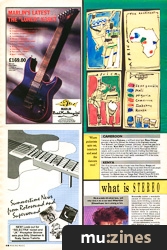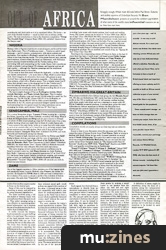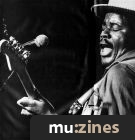Magazine Archive
Home -> Magazines -> Issues -> Articles in this issue -> View
Out Of Africa | |
Article from Making Music, September 1987 | |
Strangely enough, African music did exist before Paul Simon. Guitarist and stubbly supremo of GlobeStyle Records Mr Ben Mandelson presents an around the continent appreciation of what some of the world's more influential musicians are up to. New fans start here.

Just a few years ago — well 10, actually — it was easy to pick African records. For a start your choice was limited. Few labels were releasing current African pop and only one or two dedicated shops offered a selection. Basically, you took what you found. Now, we're fortunate to have a bunch of British-based labels and importers offering us music a-plenty, and it's possible to build an African record collection as part of your normal way of life. Here is my totally biased guide for the perplexed.
These records aren't strange — at least no more strange than our current pop output. Insist that your local dealer stocks them. If for some peculiar reason this is impossible, remove your patronage and contact Sterns African Records, (Contact Details), who have the best stock of African records — including all the current imports. Tell them Ben sent you (this won't guarantee a discount).
CAMEROON
Cameroon gives us Makossa, a well-hard street beat. Manu Dibango provided a big hit for Michael the Jackson in the litigiously recycled 'Soul Makossa', but Dibango's newest, 'AfriJazzy', shows how open he is — to all music. Moni Bilé's "Tout Ça, C'est La Vie" (Sappa MB 0111) was produced in Paris (as is so much of current Francophone African output), and is a great record with the knack of adding that little bass kick or production trick at just the right time to propel you danceward. I don't know if it's deep since I can't, sadly, understand 97% of the lyrics, but Makossa fiends should start here.
KENYA
Two of my favourite styles of music come from Kenya: Benga and Taarab. They're very different. Benga is pop music from the Luo people of West Kenya — praise songs and 100mph guitars, honky-tonk sentiment and crisp hi-hat, everyday life played fast by participant observers. Try Shirati Jazz on "Benga Beat" (World Circuit WCB 003).
Taarab is muslim coastal music influenced as much by Indian film soundtracks and Arab radio as it is by mainland Africa. The lyrics — as part of the Swahili tradition — stand on their own as serious, subtle poetry. The best introduction to this is the American compilation "Songs The Swahili Sing" (Original Music OMA 103), subtitled 'classics from the Kenya coast'.
NIGERIA
Sunny Ade is Nigeria's best-known musical export, and he and his band play JuJu music. This is Yoruba pop music — Yoruba is a pitch based language — and it's electric, contemporary, with plenty guitars and percussion. One number is effortlessly segued into the next, so that each album is two long dancing tracks. The lyrics praise famous men, patrons, petrol stations, current events; the tunes are bittersweet, with Hawaiian guitars playing counter-melodies and the Yoruba talking drum conversing with and commenting on the vocals. Sunny Ade's records are widely available (various Island UK releases, and imports) and are all high quality — although the Nigerian pressings add the traditional frying breakfast sound to the music.
If you want to hear this music without the high-tech — in fact, without any electric instruments — you must listen to Fuji, which is newer than JuJu. Don't imagine, oh colonialist, that music with guitars is more 'evolved' than a singing and percussion ensemble — Fuji deals with the same subjects, albeit with a Muslim stance. This is Islamic music (you'll notice that straight away in the singing) but it's also Yoruba (you'll hear the talking drum and the rest of the percussion panorama). It's mesmerising and exceedingly funky, the drums sounding like all of your best programs at once but much more flexible.
The heavyweight champs of Fuji are Kollington Ayinla, <,b>Sikiri Ayinde Barrister, and Wasiu Ayinde Barrister. They're mighty prolific: many albums a year and around 100,000 sales for a good 'un. For starters, try "Ori Mi Gbe Mi" (Olumo KRLPS 15) by Kollington, or "Okiki" (Siky Oluyole SKOLP 033) by Sikiri Ayinde Barrister. Meanwhile in the UK, master percussionist Gasper Lawal has worked hard pioneering his own special sound: he takes meticulous care in arranging his music, and it shows ("Abio'sun Ni" Hot/Cap 1).
SENEGAMBIA, MALI
For a young Senegalese singer, Youssou N'dour is going far — touring the States, appearing with Peter Gabriel, recording with Sting. What is it that old Sledgehammer and Sting and me and everyone in Senegal and plenty of other smart people go crazy for? It's that voice. Over a fast, modern backing where you might dare to think of a wally fusion solo, Youssou goes to the outer limits, holds on to notes that only make sense to us do-re-mi mortals after we've heard him do it, and sings melody lines whose contours are one wild skyline. Start with N'dour and his Super Etoile de Dakar's "Immigrés/Bitim Rew" (Celluloid CEC6709), and work forwards and backwards among his releases.
Where Youssou is high, resonant and youthful, his Malian peer Salif Keita is bluesy, devious, and sings with the voice of experience. A founder of the renowned Super Rail Band of the Buffet Hôtel de la Gare de Bamako, Mali ("New Dimensions In Rail Culture" GlobeStyle ORB 001), his latest release "Soro" (Sterns 1020) is a 48-track-very-posh recording where his voice obliquely fills every nook and cranny.
This same singing, lyrical content and musical confidence can be found in acoustic music too: Jali Musa Jawara (an Andy Kershaw fave, Radio 1 listeners) and his ensemble (eponymous LP on Oval OVLP 511) use koras (large harps), balafon (xylophone), singing, and acoustic guitar to hold you spellbound, while Dembo Konteh and Kausu Kouyateh's "Tanante" (Rogue FMSL 2009) will astonish you with its audacious kora bounce.
"Where guitarists spin out, interlock and send the dancers mad."
ZAIRE
One of the biggest countries in Africa contains one of the biggest (girth and popularity) stars: Luambo Makiadi, alias Franco, the maître, the sorcerer. He founded his TPOK Jazz in 1956 and hasn't looked back — the evolution of his music is almost a model of the evolution of Zairois pop music. His early hits ("Originalite" on RetroAfric) show him reinventing Latin music with electric guitars, local vocals and wailing horns. His 'classic' period can be heard on "6 Juin 1956 - 6 Juin 1980 - 24 ans d'Age" (Visa 1980 FRAN 004/005): romantic power tensioned by a disciplined force — full, smooth, long-lined harmony vocals, horns and multi-layered guitars with Franco at the helm. For me, a perfect record. He's not static either; his most recent record is a marathon talk-over government health warning about AIDS — his pal President Mobutu obviously thought Franco's influence greater than the usual state progaganda machine. For an excellent new record of his, try "Special 30 Ans" (Choc Choc Choc 007).
Reacting to the overpowering stature of Franco in Zaire, in the last 10 years there has been a 'youth music' cult based around Zaiko Langa Langa, the Choc Stars, Victoria Eleison and Papa Wemba. If Franco is establishment, these guys are punks — or at least, fashion rebels. They concentrate on high quality import clothing and high excitement playing. Their speciality is the 'seben' — the second part of the tune where the guitarists spin out, interlock, and send the dancers mad. Don't underestimate the singing: it's not the immaculate stream of Franco, but it's a ragged mixture of shouts, moving parts, mysterious questions and chorused answers. I think it's magic.
Find some imports through your friendly dealer — try Evolocko Jocker & Langa Langa Stars' "Doné Bis" (VeVe International EVVI 71), and don't bypass the Choc Stars albums "Choc-Shock-Choc" (GlobeStyle ORB 009) and "Awa Et Ben — Second Choc" (GlobeStyle ORB 010). For something a little more sweet pick up Kanda Bongo Man's "Non Stop, Non Stop" (GlobeStyle ORB 005); — direct enjoyment, a soukous guitar party.
ZIMBABWE-VIA-GREAT-BRITAIN
What about everybody's fave African beat group, the fab Bhundu Boys? OK, OK, this ace Zimbabwean 'Jit' combo has been working up a high profile in the UK in traditional rock 'n' roll manner: endless touring, radio shots, pushy indie label, and now a signing to a major with old Elvis Costello as special producer. A success story, given the usual difficulties for African musicians in Britain: the Bhundus have sidestepped the common belief in the exoticism of African music. "Shabini" (DiscAfrique AFRILP 03 — make sure you order the gold top remix from your musical milkman) is my current BBs pick platter. If you want to hear the Zimbabwean context of the Bhundu phenomenon, you should immediately possess "Viva Zimbabwe" (Earthworks ELP 2001) and "Take Cover" (DiscAfrique AFRILP 01).
COMPILATIONS
Compilation records are nearly always an ideal way into an unknown musical area.
Sooner or later in any discussion about the pop scene and Africa, up comes the name of famous Soweto boxer Paul Simon. Right or wrong in dealing with South Africa, he has really focussed attention on several styles of South African pop. The name that used to come up as folk devil was svengaloid Malcolm MacLaren, but you can hear the local reality behind these European names on "The Indestructible Beat Of Soweto" (Earthworks EMW 5502), "Duck Food" (Earthworks EMW 5505), and possibly everything else on Earthworks.
"Sound D'Afrique/"Sound D'Afrique 2 — Soukous" (Island ISSP 4003/4008) and "Compact D'Afrique" (GlobeStyle CDORB 907) are three good compilations of (mainly) Zairois pop music. Modesty forbids that I tell you how good they are since I compiled them.
Finally, two packages with a broader brief: "WOMAD Talking Book Two" (WOMAD 003) and "Bantu" (Ciciba 8401/2). Subtitled "An introduction to Africa", the WOMAD record presents just that. Each track is matched with an informative article contained in the record sleeve/folder which gives you plenty of ideas about the techniques, thoughts and fives of the musicians. "Bantu", released by the international Centre for Bantu civilisation, is dedicated to music of the Bantu language family. Since this is practically the whole of sub-Saharan Africa, there's a lot covered in this anthology — 19 tracks of current pop and current traditional music from 10 countries. A bonus is the full sleeve info in English (and other languages).
More with this topic
Oddballs & Out Takes - Studio tales |
Grafton Vintage Sax - Alto Saxophone |
 Sampling Through The Ages |
Blues - Alive and Kickin' in Texas - Texas Blues |
A History of Electronic Music (Part 1) |
Overtones |
Story of the Blues |
The Wonderful World of Womad |
That Celebrated, Cultivated, Underrated Nobleman... The Juke |
The Fender Bass Story |
Six Great Moments In Sound History |
Back To The Roots |
Browse by Topic:
History / Culture
Publisher: Making Music - Track Record Publishing Ltd, Nexus Media Ltd.
The current copyright owner/s of this content may differ from the originally published copyright notice.
More details on copyright ownership...
Feature by Ben Mandelson
Help Support The Things You Love
mu:zines is the result of thousands of hours of effort, and will require many thousands more going forward to reach our goals of getting all this content online.
If you value this resource, you can support this project - it really helps!
Donations for May 2024
Issues donated this month: 0
New issues that have been donated or scanned for us this month.
Funds donated this month: £0.00
All donations and support are gratefully appreciated - thank you.
Magazines Needed - Can You Help?
Do you have any of these magazine issues?
If so, and you can donate, lend or scan them to help complete our archive, please get in touch via the Contribute page - thanks!















